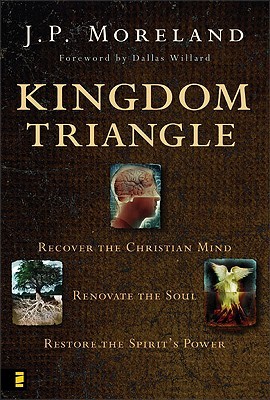J. P. Moreland: Kingdom Triangle

J. P. Moreland, Kingdom Triangle: Recover the Christian Mind, Renovate the Soul, Restore the Spirit’s Power (Zondervan, 2007), 237 pages, ISBN 9780310274322.
I want to foment a revolution in Evangelical life… My purpose is to mobilize, inspire, envision, and instruct an army of men and women for a revolution on behalf of the cause of Christ.
If I could pick out for you a few of the most formative books in my own intellectual development, as a believing Christian, J.P. Moreland’s Love Your God with All Your Mind would be jostling at the top. I wish I could thrust a copy of it into the hands of every Christian student, pastor and teacher. I can at least commend it to you as essential reading—after C.S. Lewis’s Mere Christianity, of course. But before you read either, I believe you should read Kingdom Triangle. And I think if you do read it carefully, cover to cover, you might just forgive me for putting J.P before Jack.[1]
Kingdom Triangle is a biblically grounded vision of Christian discipleship, uniting J.P Moreland’s concern for the Christian mind with his pursuit of the spiritual disciplines, and calling for the whole Church to rediscover the power of the Holy Spirit. Taking the parts in isolation, it doesn’t appear to be saying anything radically ‘new’. As Moreland himself admits, the first point of the triangle will come as no surprise to anyone familiar with his writings; J.P is well-known among evangelicals as a philosopher and apologist, and Love Your God with All Your Mind was but one incarnation of his characteristic emphasis on a more tough-minded Christianity. It is a concern shared by many writers besides J.P. The ‘spiritual disciplines’ also have a well-established literary corpus and a number of contemporary advocates. And the charismatic stress on the manifest power of the Spirit is something many of the readers of this article probably share. What is rather unusual—and exciting—is to see all three of these emphases united together, without one being played off against the other.[2]
The first part of the book is decidedly philosophical. J.P offers us a penetrating expose of the cultural milieu of the West. In the discussion that follows, Moreland identifies naturalism, postmodernism, and Christian theism as the three major worldviews vying for our allegiance, and concerns himself with expounding both naturalism and postmodernism in some detail. Both are exposed as pervasive, pernicious, false—but also dangerously ‘thin’ worldviews, lacking the resources to ground objective value, purpose and meaning, and ultimately destructive of the good life, plunging us into a shallow and sensate culture. ‘Under the influence of naturalist and postmodern ideas, many people no longer believe that there is any ultimate meaning to life that can be known. These folks—and they are legion—have given up on seeking that meaning and instead are living for happiness. Today, the good life is a life of happiness’. And the drive for happiness – construed as ‘pleasurable satisfaction’—has produced a culture of ‘empty selves’.
J.P however believes ‘we are wired for more than happiness. We are made to live for God’s honour by learning how to become spiritually competent, mature members of his Kingdom and to make that Kingdom our primary concern’. Claiming the supremacy of the Christian worldview, Moreland exhorts believers to recognise the superior spiritual and intellectual resources available to them in Christ, and to start taking their faith seriously, heart and mind. ‘We were made for greatness’, he argues, but our present culture ‘undermines both its intelligibility and achievement’. ‘The only way we are going to move from our boring lives to lives filled with the drama of the Greatest story is for those who embrace mere Christianity to set aside the shallowness of their thought and the weakness of their spiritual practices, and corporately to enter afresh into the Kingdom forms of life and thought worthy of the name of Christ’.
Category: Living the Faith, Pneuma Review, Spring 2008


